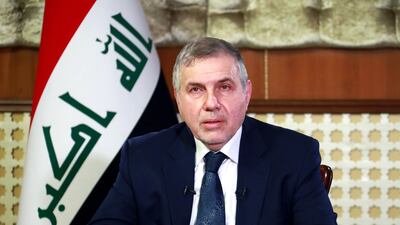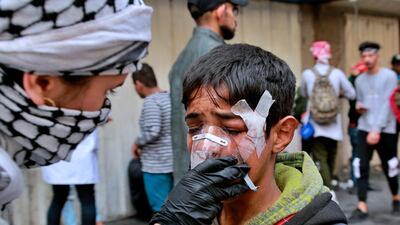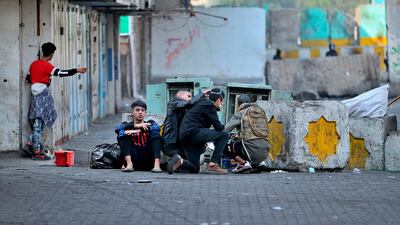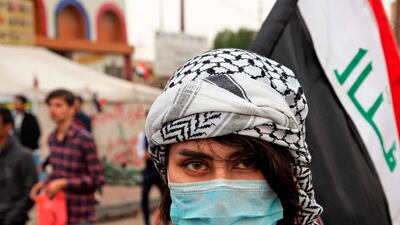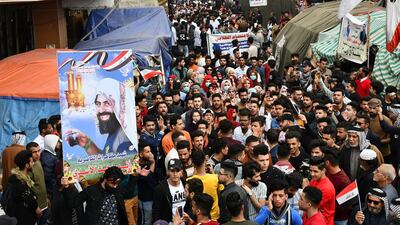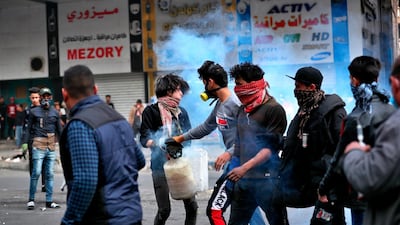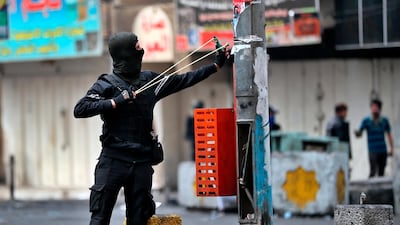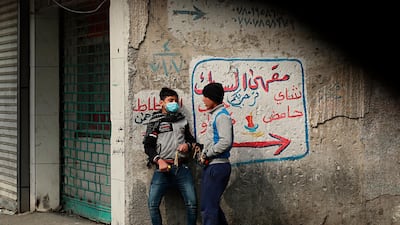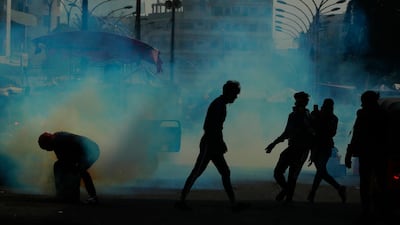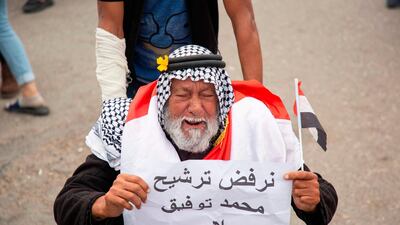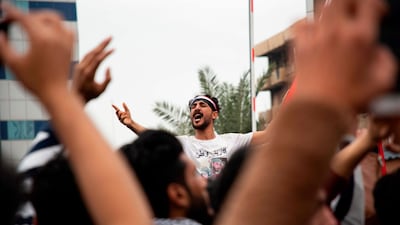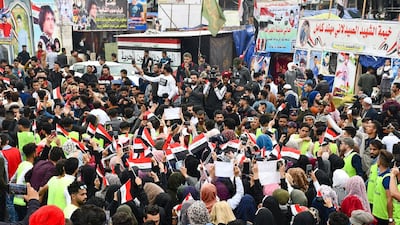With some Kurdish and Sunni political forces threatening a boycott, the cabinet of Iraqi Prime Minister-designate Mohammed Tawfiq Allawi may be floundering only days after he said he was ready to seek the confidence of MPs.
Mr Allawi, 65, is a veteran Shiite politician, two-time Member of Parliament and former minister. He was tipped for the role of prime minister after Adel Abdul Mahdi resigned on November 30 amid bloody nationwide protests against years of corruption, lack of services and unemployment.
The new prime minister designate will head to parliament on Monday to lay out his plan of work and for MPs to vote on giving confidence to the new administration. However, behind the scenes, the nominee of Fatah, the largest Iranian-backed parliamentary bloc led by Hadi Al Amiri, and Sairoon, the second-largest bloc led by the Shiite influential cleric Moqtada Al Sadr, are still trying to lobby MPs to back the new administration.
The blocs need 166 of the 329 MPs to vote in favour of Mr Allawi’s proposed cabinet and plan.
As the clock ticks, not all political factions are on board with Allawi and although he might have the numbers in the vote, he still doesn’t have crucial cross-confessional support.
"The situation is very complicated and it will be difficult to vote on the government's formation on Monday," a head of a Shiite parliamentary bloc involved in the talks told The National.
“Many prominent Kurdish and Sunni blocs still reject Allawi's options. They insist on keeping the ministries originally assigned to them and nominating their candidates … while Allawi insists on the distribution of ministries and the nomination of candidates away from the interference of blocs,” he added.
An effort to unite Shiite, Sunni and Kurdish political forces has been in full swing for three weeks.
The two key politicians opposite Mr Allawi’s cabinet are veteran Kurdish leader Masoud Barzani, who controls 30 seats and has a significant influence on the remaining 30 seats held by other Kurdish blocs, and Parliament Speaker Muhammad Al Halbusi, the leader of the 40-seat National Forces Alliance.
It appears that the pair are concerned about Mr Allawi’s plan for naming his ministerial team.
Normally, political blocks agree the share of ministries each and hand the prime minister a list of names for him to choose ministers. However, Mr Al Sadr and Mr Amiri have said publicly that Mr Allawi will have the freedom to choose his colleagues without the interference of the blocs.
"We are determined to have a say in choosing our ministers in the central government,” Ardlan Noor, one of the leaders of the Kurdistan Democratic Party, said. He said that national elections determine the number of seats in parliament and therefore each bloc’s share in cabinet so this needed to remain “otherwise there is no necessity to hold the elections”.
Last week, Mr Al Halbusi met with Mr Al Barzani in a bid to get him on side. Since last Sunday’s Erbil meeting there have been a slew of joint meetings between Shiite, Sunni and Kurdish leaders in Baghdad “in an attempt to bridge points of view,” a Shiite leader involved in the talks said.
Those involved in the talks confirmed that Mr Allawi has yet to disclose the names of his ideal cabinet or make deals with factions, even with his backers in the major Shiite blocs that propelled his candidacy forward.
Senior members of the Fatah bloc said that Mr Allawi’s cabinet will have 22 ministers divided between sects with 11 Shiite ministers, six Sunni and five Kurdish. Even as Mr Al Sadr says he is giving Mr Allawi free reign to choose ministers, he is insisting that he keeps the same portfolios — oil, electricity, health and transport.
A proposal by Mr Barzani for his former advisor and caretaker Finance Minister Fouad Hussein to keep his position was rejected, two senior Shiite leaders involved in the ongoing talks said.
Up against a deadline, a Shiite politician said that they are hoping Iranian pressure on Mr Barzani and Mr Al Halbusi will force a resolution as “both leaders enjoy good relations and open [or] undeclared alliances with the Iranians".
However, a senior Shiite MP said that Mr Al Sadr has not waited for Tehran’s intervention and has already begun putting pressure on the pair.
Al-Sadr has backed in Najaf on Saturday and he has issued a statement upon his arrival threatening to besiege the Green Zone, where the parliament and most of the government buildings, and diplomatic missions are located, in the event that the proposed Allawi government is not voted.
A prominent Sadrist politician said that the cleric has sent Mr Al Halbusi a letter warning that if he back’s Mr Barzani’s position then the Sairoon bloc would look to withdraw confidence in him as the speaker of parliament.
A similar message was sent to Mr Barzani through President Barham Salih, the politician added. Mr Al Sadr reportedly told the Kurdish leader that if he doesn’t change his position, the Shiite blocs will withdraw the candidacy of Mr Allawi and renominate Haider Al Abadi, the former prime minister.
Mr Al Abadi had a hostile relationship with the semi-autonomous Kurdish Regional Government during his tenure.
"The Kurds know that Iran can create dozens of problems for them inside and outside the region, and they also know that Sadr is able to implement his threat to renominate Abadi and rally the Shiite and Sunni support necessary to accept it,” one of Fatah’s prominent leaders, who asked not to be named, said.
“Therefore, I do not rule out the change of the Kurdish position in the coming days.
“As for Halbusi, dealing with him is much easier. He is already an ally of the Iranians and Fatah, and they are the ones who brought him to his current position and it will not be difficult to convince him and his allies to support Allawi and his government”.
Mr Halbousi left the country on Friday, his office media said. All signs from the closed sessions on Saturday suggest that Mr Allawi’s backers may go forward without Mr Halbousi, while the Kurds still hope to reach better agreement.
The Shiite forces already control more than 140 votes and united to support Mr Allawi. Even without Mr Barzani and Mr Halbusi, they are likely to be able to get the backing of up to 30 smaller Sunni political forces.
However, it is still important to get the backing of the two holdouts as Shiite leaders do not want to be seen to be forcing through an already unpopular administration in the face of mass protests on the streets that have already seen over 500 people killed.
